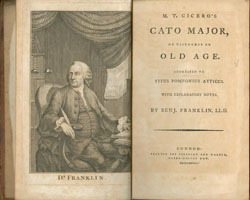Ben Franklin Books
|
| updated |
Copy Link Code
|
 As a printer, publisher and prolific writer, books by Benjamin Franklin were some of the most widely read of the 18th century in America and throughout the English-speaking world. Born in 1706 to a modest working family in Boston, Franklin's first work was as an apprentice under his brother James in a print shop. In 1721, James founded the New England Courant, a newspaper that quickly became controversial for including humorous and political content. At the age of 16, Benjamin Franklin got his first taste of writing to a large readership when he sent in anonymous opinion pieces to be printed in the Courant under the pseudonym Mrs. Silence Dogood. His writing was satirical and subversive, bringing great attention on the newspaper but infuriating his brother when young Benjamin admitted to being the writer. This is a major reason why Franklin left for Philadelphia. There, he soon became the owner of his own print shop and newspaper, The Pennsylvania Gazette, as well as producing the first series of Ben Franklin books, "Poor Richard's Almanack" in which he included poems, sayings, and satire along with a calendar of weather, astronomical and astrological information like a normal almanac. Some of the aphorisms included in these Franklin books have survived into the modern American lexicon. Franklin also wrote many scientific essays on topics such as electricity and ocean currents.
As a printer, publisher and prolific writer, books by Benjamin Franklin were some of the most widely read of the 18th century in America and throughout the English-speaking world. Born in 1706 to a modest working family in Boston, Franklin's first work was as an apprentice under his brother James in a print shop. In 1721, James founded the New England Courant, a newspaper that quickly became controversial for including humorous and political content. At the age of 16, Benjamin Franklin got his first taste of writing to a large readership when he sent in anonymous opinion pieces to be printed in the Courant under the pseudonym Mrs. Silence Dogood. His writing was satirical and subversive, bringing great attention on the newspaper but infuriating his brother when young Benjamin admitted to being the writer. This is a major reason why Franklin left for Philadelphia. There, he soon became the owner of his own print shop and newspaper, The Pennsylvania Gazette, as well as producing the first series of Ben Franklin books, "Poor Richard's Almanack" in which he included poems, sayings, and satire along with a calendar of weather, astronomical and astrological information like a normal almanac. Some of the aphorisms included in these Franklin books have survived into the modern American lexicon. Franklin also wrote many scientific essays on topics such as electricity and ocean currents.
Although he was often the subject of praise and ridicule in cartoons and essays from other prominent contemporary writers, the first of the books about Benjamin Franklin must have been his autobiography. Franklin took years to put together this personal work and saw it as a means of communication with future generations of his family and the young nation he helped form. For this purpose, Franklin included the 13 virtues by which he lived (or by which he attempted to live) for his descendants to follow. In modern times, books on Benjamin Franklin have cast him as a central figure in the development of American culture, not to mention as an independent nation. Biographies on Franklin include titles such as The First American and A Great Improvisation while scholarly books on Benjamin Franklin have deemed him The First Scientific American and spoken of him Stealing God's Thunder. As America's true renaissance man, Franklin can be the subject of political, scientific and philosophical review all in one book or as separate functions of an eccentric character.
Near the end of his life and indeed after his death, Franklin's legend and significance brought his work around the world. In Britain, "Poor Richard's Almanack" was distributed in the form of a popular broadside. During the American War of Independence, the King of France named a ship after Poor Richard and loaned Bonhomme Richard to the American naval hero John Paul Jones for fighting the British. In 1797, Napoleon had "Poor Richard's Almanack" translated into Italian and spread throughout his territory in Northern Italy. In 1812, the "Almanack" became the first English-language book to be translated into the language of Slovenia.
